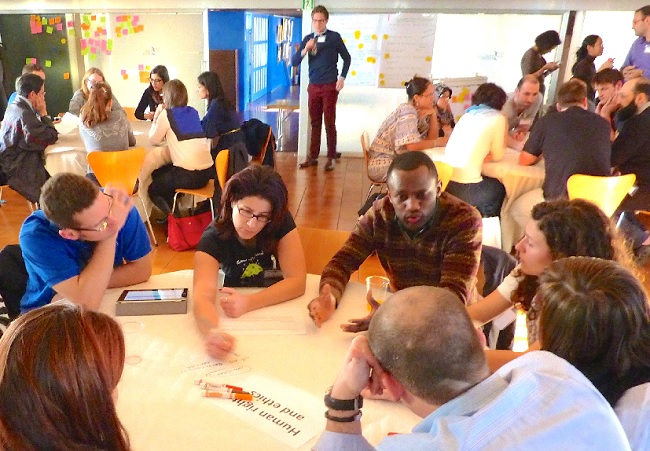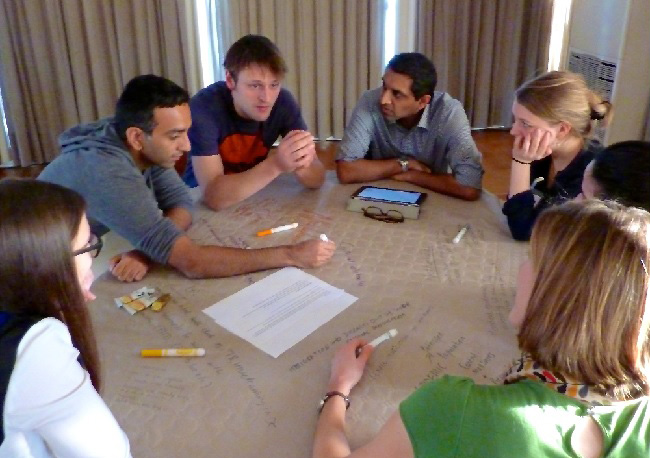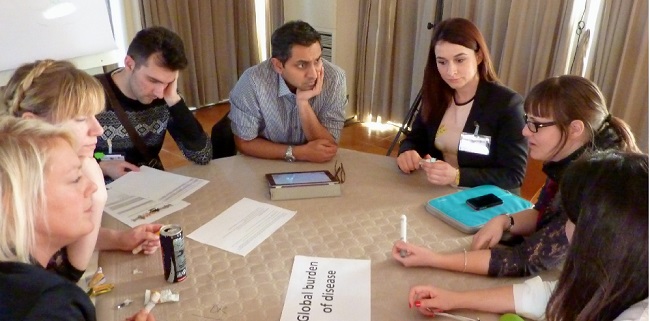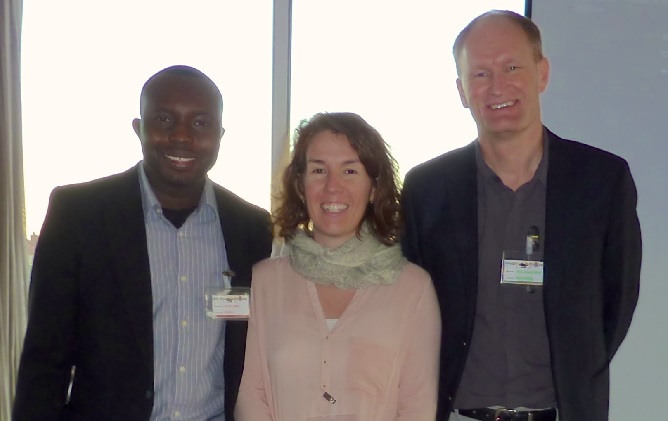Global Health and Young Family Doctors - VdGM Forum 2014

Earlier this year, the first Vasco da Gama Movement Forum, held between WONCA Conferences, gave trainee and new Family Doctors an opportunity to meet and participate in workshops, present posters, hear a variety of speakers and generally exchange views and experiences on being a Family Doctor. One such session was the World Café workshop on the subject of 'Global Health'. Over 50 enthusiastic Family Doctors moving to the beat of
Azonto, danced between tables where they discussed and illustrated different themes.
These themes provided a framework to facilitate discussion on the sometimes tricky subject to define, contain and conceptualise 'Global Health'. The themes included the global burden of disease, socioeconomic and environmental determinants of health, cultural diversity and health, health systems and workforce, global health governance, and human rights and ethics. Discussions that drew on the experiences of new and trainee Family Doctors from diverse countries including Albania, Denmark, Egypt, France, Greece, Ireland, Luxembourg, Netherlands, Portugal, Spain, Turkey and UK proved to be rich and inspiring. Summaries and photographs from a selection of the tables are outlined here as a collective effort by the participants in order to share some of the discussions which took place with the wider WONCA network.
The theme of
Cultural Diversity and Health facilitated by Ana Nunes Barata (Portugal) generated discussion on the significant role that culture has on how disease is perceived and how different health beliefs often have cultural origins. There was acknowledgement that globalisation has led to greater cultural diversity within many countries, but also that there are relevant cultural differences between individuals in the same country (different age groups, socioeconomic status, etc.). Whilst making work more interesting this also increase

s the challenges for Family Doctors in terms of being able to understand and holistically care for patients from diverse cultural backgrounds.
Discussion on the theme of the
Global Burden of Disease facilitated by Sandeep Geeranavar (UK) highlighted the emergence of new (and old) health challenges that could be considered a result of growing social, economic and political interconnectedness, globally. Examples included the non-communicable diseases 'epidemic' , the influenza pandemic, the role of the media and multi-national pharmaceuticals in influencing public perceptions, the rise in mental health problems, HIV, Malaria and TB rates in Greece due to the financial crisis, and the impact of economic and political instability such as the war in Syria on individuals and their families, as well as on the countries in which they seek refuge.
Participants who discussed
Socioeconomic and Environmental Determinants of Health, facilitated by Liliana Laranjo (Portugal), acknowledged health literacy, education, and socioeconomic status as major determinants of health, and concluded that more policies should exist to address them. Accordingly, bottom-up community-based interventions to promote health education, as well as facilitate access to primary care, were seen as crucial elements in improving health outcomes. On the other hand, the group discussed that recent developments in health information technology may have the unintended consequence of increasing health inequalities, which should be closely monitored. Finally, participants recognised how environmental factors such as pollution, global warming, neighbourhood walkability and access to fresh produce stores have the potential to influence the health of populations worldwide.
The participants of the topic on
Global He alth Governance
alth Governance facilitated by Lisa Gambhir (Luxembourg) focused on the complexity of the roles of governmental, international organisations, the commercial sector and civil society in health. The political and economic stability of countries as factors affecting the security, empowerment and therefore health of women and their families were explored. The role of World Health Organisation in influencing national government policy was discussed, as well as how health-related research is conducted and governed globally. Participants concluded how important the existence of multiple organisations was in order to represent different groups, yet recognised that unnecessary competition and fragmentation of efforts could also arise as a result - the example of the emergency response in Haiti after the 2010 earthquake was given.
The
Health Systems and Workforce themed table facilitated by Peter Sloane (Ireland) explored the diversity of function of health systems across the globe, and the diversity and mobility of the EU workforce with its associated impact within Europe and elsewhere. There was consensus that the doctor-patient relationship should be at the heart of all health systems and that Family Doctors had an important gatekeeping role (perhaps better referred to as 'gate-facilitating') to play. However, numerous structural, financial and cultural factors impact on how this plays out in different countries. There was recurrent discussion about the need to shift the focus of healthcare and resources from secondary and tertiary care to primary care, and to encourage and develop systems of working together through primary care teams.
In conclusion, the huge spectrum of healthcare systems and of factors which influence health globally was recognised. It was agreed that being able to design a one size fits all health system model was likely to be neither achievable nor desirable. However, there was an appreciation that much can still be learnt from one another, and it was agreed that globalisation is playing an increasing role in the health of communities worldwide. Therefore if Family Doctors of the future are to be able to effectively rise to the challenges that this brings, family medicine training will need to better prepare us to do so.
 Workshop coordinators: Luisa Pettigrew (UK), Per Kallestrup (Denmark) & Laminu Kaumi (Spain/Nigeria) (all pictured at left)
Workshop coordinators: Luisa Pettigrew (UK), Per Kallestrup (Denmark) & Laminu Kaumi (Spain/Nigeria) (all pictured at left)
Workshop facilitators: Sandeep Geeranavar (UK), Liliana Laranjo (Portugal), Peter Sloane (Ireland), Ana Nunes Barata (Portugal), Lisa Gambhir (Luxemburg), Sara del Olmo (Spain).
With special thanks to all the participants who generated stimulating discussion and creative drawings to capture this.